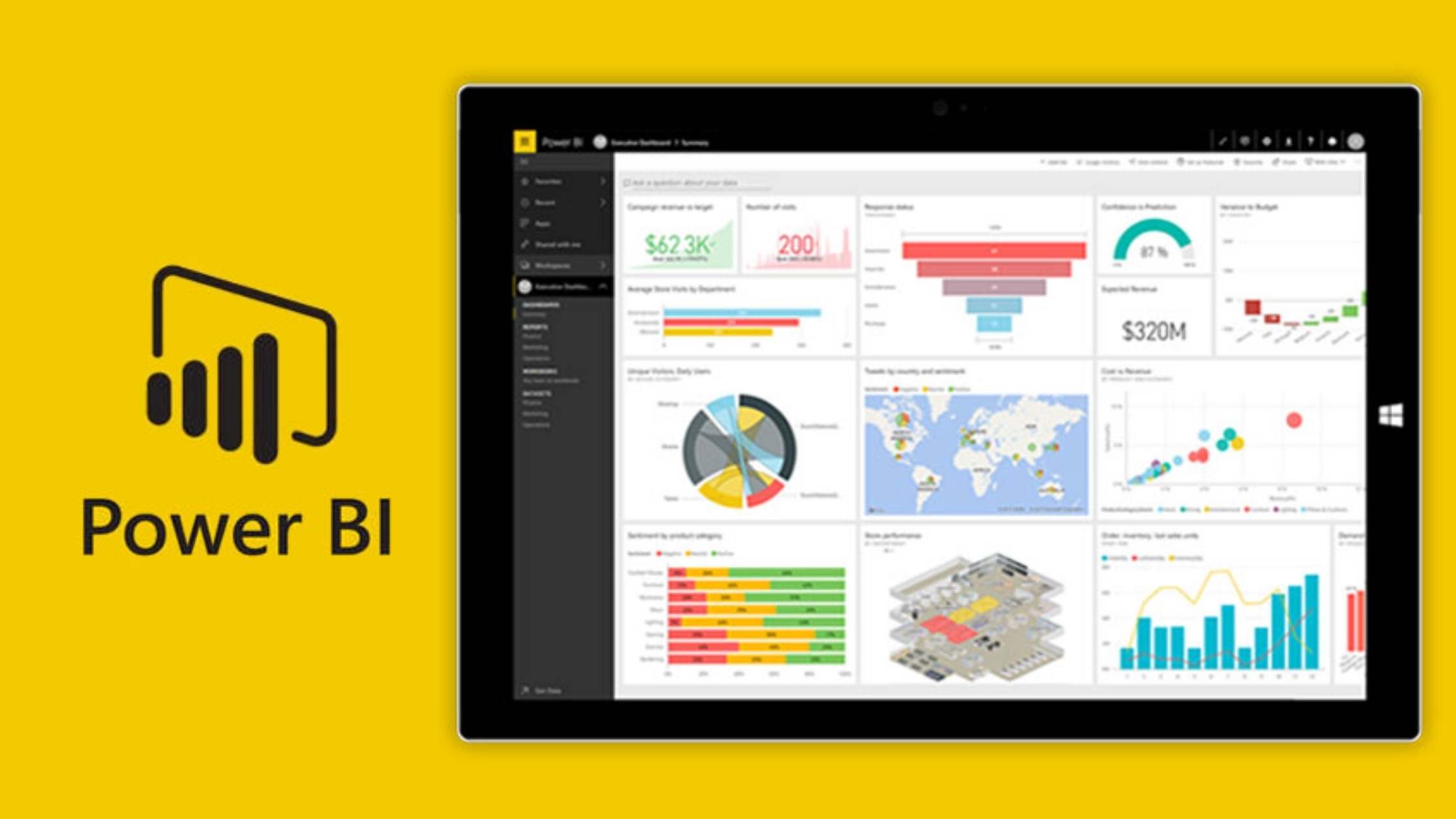Introduction
In 2025, data isn’t the problem making sense of it is.
Every business is collecting more information than ever: revenue numbers, customer data, supply chain metrics, marketing KPIs, employee productivity stats… it’s endless. But the difference between businesses that grow fast and businesses that stall is simple what they do with that data.
Enter Power BI.
Microsoft’s Power BI has become one of the most powerful tools for transforming raw data into live dashboards, reports, and strategic insights. But here’s the catch: Power BI on its own isn’t enough. Most businesses don’t need just a dashboard they need a complete reporting system that answers real questions, fast.
That’s exactly where a Power BI Consultant makes a difference.
What Does a Power BI Consultant Do?
At first glance, it might seem like a Power BI Consultant just builds dashboards but the reality is much deeper and more valuable.
A skilled consultant brings structure, clarity, and efficiency to your data strategy. They bridge the gap between your IT infrastructure and your decision-making teams – making sure your data isn’t just organized, but actionable and consistently aligned with business goals.
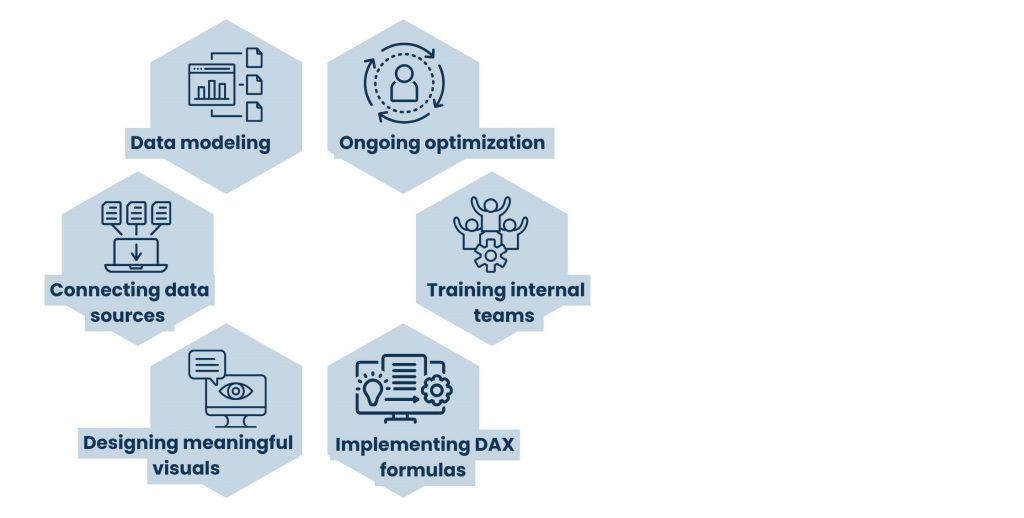
Here’s what a Power BI Consultant typically handles and why each function matters:
1. Data modeling: Raw data from platforms like CRMs, ERPs, or Excel is often messy and disconnected. A consultant cleans, structures, and relates this data into logical models that support easy filtering, analysis, and drill-down — turning chaos into clarity.
2. Connecting data sources: They integrate databases like Salesforce, HubSpot, Google Analytics, and SQL into Power BI, ensuring automated data refreshes. This removes the need for manual uploads and guarantees up-to-date reporting.
3. Designing meaningful visuals: Dashboards aren’t just charts — they’re decision tools. A consultant creates layouts that highlight KPIs, spot trends, and answer the real questions your teams face daily.
4. Implementing DAX formulas: DAX is the secret to powerful custom logic. From calculating rolling averages to complex YoY comparisons, a consultant writes formulas that bring depth to your data.
5. Training internal teams: Power BI adoption increases when teams understand it. Consultants offer hands-on guidance so business users can explore reports confidently without depending on IT.
6. Ongoing optimization: As the business evolves, so do its data needs. A consultant ensures reports grow with the company — refining queries, adding new fields and improving speed over time.
The result? You don’t just get better reports — you get smarter decisions, faster.
Why Power BI? And Why Hire a Consultant Instead of Just Using Templates?
Power BI is powerful — but only when implemented the right way.
While it comes with built-in templates and quick-start features, most businesses outgrow those very quickly. Why? Because every company has unique KPIs, multiple data sources, and different team needs. That’s where the expertise of a Power BI Consultant brings real, long-term value.
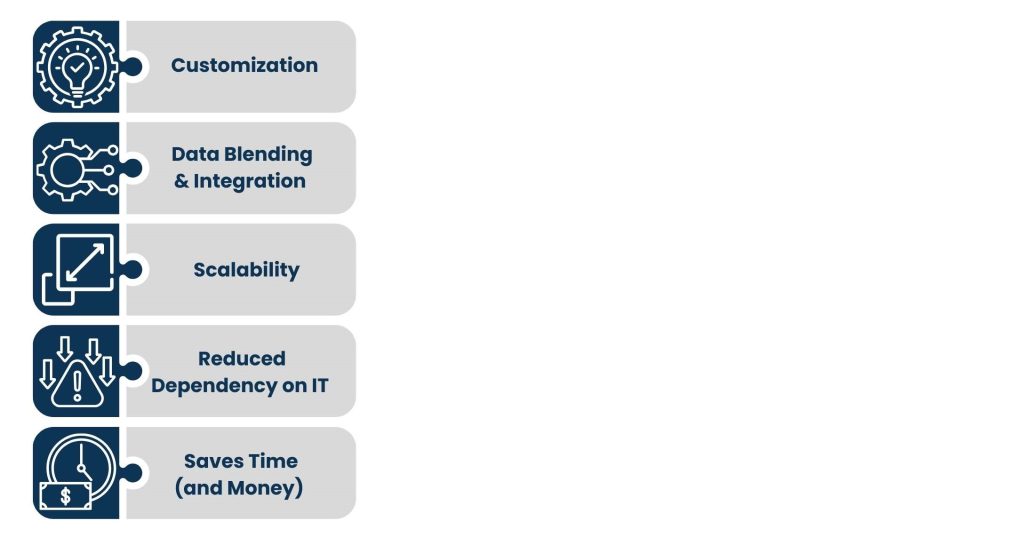
Here’s why hiring one makes more sense:
1. Customization:
Templates give you generic visuals. They don’t reflect your sales cycle, your customer journey, or your internal KPIs. A Power BI Consultant takes time to understand your specific business processes and pain points. They design dashboards that surface exactly what your team needs to see — not just what the software makes easy. From departmental goals to C-level reports, everything is tailored.
2. Data Blending & Integration:
Most companies have data spread across CRMs, Excel sheets, accounting software, web tools, and internal databases. A consultant connects all these sources to build a centralized, live view of performance. This breaks down data silos and enables deeper insights — like comparing marketing spend to sales revenue or aligning HR capacity with operational output. Integration turns fragmented data into a single source of truth.
3. Scalability:
Your reporting setup might work now — but can it handle 10x more data next year? Consultants build with growth in mind. They create flexible models that can easily accommodate new data sources, additional metrics, and larger datasets without slowing down dashboard performance. This future-proofing saves massive rework later and ensures your reports evolve with the business.
4. Reduced Dependency on IT:
Most business teams get stuck waiting on tech support to add a column, fix a filter, or update a report. A consultant sets up reusable templates, self-serve dashboards, and user-friendly filters that allow non-technical users to explore insights independently. This cuts down on reporting delays and reduces pressure on your IT resources.
5. Saves Time (and Money):
Power BI has a learning curve. Internal teams often spend weeks (or months) figuring out how to build and troubleshoot dashboards — often with inconsistent results. A consultant brings best practices, proven frameworks, and efficiency from day one. What might take your team 6 weeks can be done in 6 days, with cleaner outcomes and fewer errors — saving both time and operational costs.
How a Power BI Consultant Supports Financial Teams
Finance teams live and die by accuracy. But speed matters just as much — and that’s where traditional spreadsheets and delayed reports fall short. A Power BI Consultant helps finance leaders get fast, reliable insight without waiting on end-of-month reports or drowning in manual work.
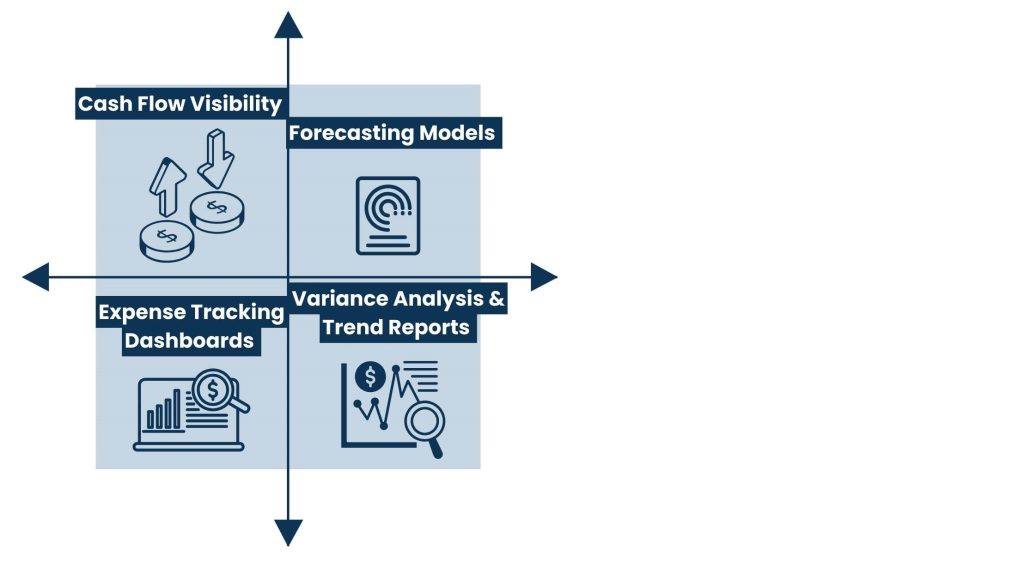
Here’s how they support finance:
1. Cash Flow Visibility:
Consultants create dashboards that track incoming and outgoing cash in real-time, across multiple bank accounts, revenue streams, and payment schedules. This helps leadership monitor liquidity and make smarter funding or expense decisions without delay.
2. Forecasting Models:
Using historical data and growth trends, a consultant builds dynamic forecasting dashboards. These models update automatically as new data flows in — allowing CFOs to project revenue, plan for expenses, and scenario-test decisions based on real numbers.
3. Expense Tracking Dashboards:
Rather than digging through spreadsheets, Power BI dashboards break down expenses by category, department, or vendor. This makes it easier to spot irregularities or overspending quickly and take corrective action.
4. Variance Analysis & Trend Reports:
Consultants design visual reports that show actuals vs. budget, period-over-period changes, and YoY performance. Finance teams can instantly identify gaps, ask better questions, and present cleaner insights to stakeholders.
The result? Finance teams move from reactive reporting to proactive strategy — with a clearer view of where the business stands, where it’s going, and what needs attention now.
How a Power BI Consultant Supports Sales Teams
Sales thrive on visibility. However, without accurate, real-time data, sales managers are forced to rely on instinct instead of insights. A Power BI Consultant helps sales leaders track performance, identify blockers, and move faster on what works.

Here’s how:
1. Real-Time Revenue Dashboards:
Consultants design up-to-date revenue reports, segmented by region, rep, or product line. Sales leaders no longer have to wait for weekly updates — they can see how they’re tracking toward targets every day.
2. Quota vs. Performance:
A Power BI dashboard clearly shows how each salesperson is pacing against their goals. These visuals help managers coach better, reward performance, and spot who needs support early in the quarter.
3. Lead-to-Close Analysis:
Consultants map the full sales funnel — from lead source to conversion — so teams know where prospects are dropping off and which sources bring in the highest-value customers.
4. Pipeline Health Monitoring:
Sales managers can view weighted pipeline value, deal stages, close probability, and forecasted revenue in one place. It’s a clearer, more strategic view of what’s real — and what needs action.
With this kind of insight, sales teams stop spending time building reports — and start spending more time selling. That’s how revenue grows faster and more predictably.
How a Power BI Consultant Supports Operations Teams
Operations teams thrive on clarity — and nothing creates more alignment than the right data at the right time. From inventory flow to delivery times to employee productivity, operations require constant visibility.
A Power BI Consultant brings structure to this chaos by designing dashboards and systems that surface real-time, department-level performance.
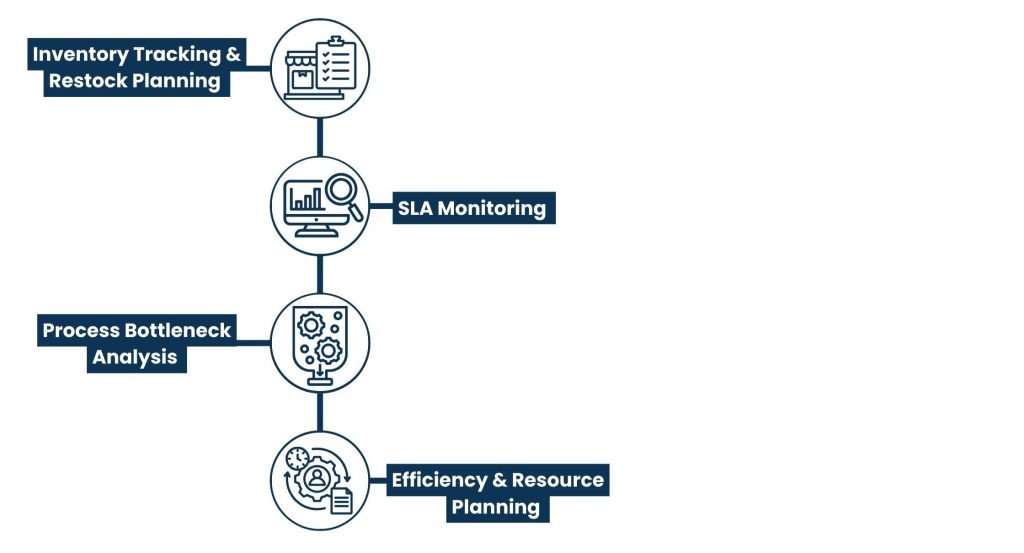
🚚 Inventory Tracking & Restock Planning:
With Power BI, consultants connect inventory systems to dashboards that show stock levels, reorder points, and turnover rates. This helps avoid stockouts or over-ordering and supports better supply chain decisions.
⏱ SLA Monitoring:
Consultants build dashboards that track service-level agreements — whether it’s delivery timelines, response times, or customer ticket resolutions. These metrics help ops leads quickly spot delays or breakdowns in workflows.
🛠 Process Bottleneck Analysis:
Power BI reveals where delays or inefficiencies are happening. Whether it’s a department, tool, or step in the workflow that’s holding things up, consultants help visualize and diagnose it fast — leading to smarter fixes.
📊 Efficiency & Resource Planning:
Consultants design custom KPIs that monitor productivity, team utilization, and resource allocation. Managers can balance workloads, justify headcount, and plan for operational scaling based on real numbers.
The impact? Operations teams no longer operate on gut instinct or delayed reports — they respond to live data and stay ahead of problems, not behind them.
What Happens When You Don’t Have a Power BI Consultant
Power BI is an incredibly powerful platform, but like any tool, however, it needs strategy and structure behind it. Without a skilled Power BI Consultant guiding implementation and optimization, businesses often face frustrating issues that reduce the tool’s impact and waste time across teams.
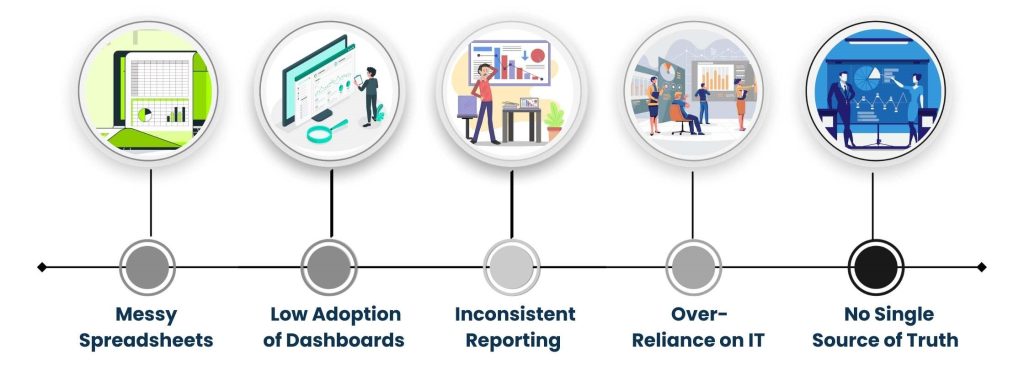
Let’s break down the most common challenges:
🧾 Messy Spreadsheets:
Without proper data modeling and dashboard automation, teams end up falling back on spreadsheets. That means duplicate files, inconsistent naming, and formulas that break when one field changes. Teams waste hours updating data manually instead of acting on insights. And when a report is needed last-minute, it’s usually outdated — or worse, wrong.
📉 Low Adoption of Dashboards:
Even when dashboards are built, they’re often too generic or cluttered. If the visuals don’t match the team’s goals or are too hard to interpret, people stop using them. Reports get ignored, and the business goes back to gut-feel decisions. A Power BI Consultant ensures dashboards are tailored to each team, making them intuitive, useful, and worth checking every day.
⚠️ Inconsistent Reporting:
Without centralized data definitions and logic, every team calculates “revenue,” “profit,” or “churn” differently. This leads to debates in meetings and mistrust in the numbers. A consultant helps define key metrics, apply logic consistently, and create a unified reporting layer — so everyone is working from the same playbook.
🧑💻 Over-Reliance on IT:
When Power BI is poorly set up, even small changes (like adding a new column or updating filters) require help from the IT team. This creates bottlenecks and delays insights. A consultant empowers business users by building self-serve dashboards and training teams to make updates on their own — without waiting on a ticket.
🔄 No Single Source of Truth:
The biggest issue is fragmentation. Sales see one number. Finance sees another. Marketing pulls from a different platform altogether. Without a central, trusted reporting system, business leaders don’t have clarity — they have chaos. A Power BI Consultant brings everything together so all teams are aligned, confident, and moving in the same direction.
By solving these problems, a consultant doesn’t just deliver dashboards — they deliver clarity, efficiency, and decision-making confidence that drives real business outcomes.
Conclusion
Visibility isn’t optional it’s everything.
A skilled Power BI Consultant helps your financial, sales, and operations teams stop guessing and start leading. From revenue tracking to operational efficiency, Power BI becomes the engine that powers faster, smarter decisions.
But good dashboards don’t build themselves. When implemented right, they turn into the most powerful tool in your tech stack helping your teams cut through the noise and move with clarity.
If your business is sitting on data and not getting enough value from it, it might be time to bring in a consultant and the right support behind them.
Because in business, clarity is a growth strategy.
About Us
Tasks Expert offers top-tier virtual assistant services from highly skilled professionals based in India. Our VAs handle a wide range of tasks, from part time personal assistant to specialized services like remote it support services, professional bookkeeping service etc. Furthermore, it helps businesses worldwide streamline operations and boost productivity.
Ready to elevate your business? Book a Call and let Tasks Expert take care of the rest.





